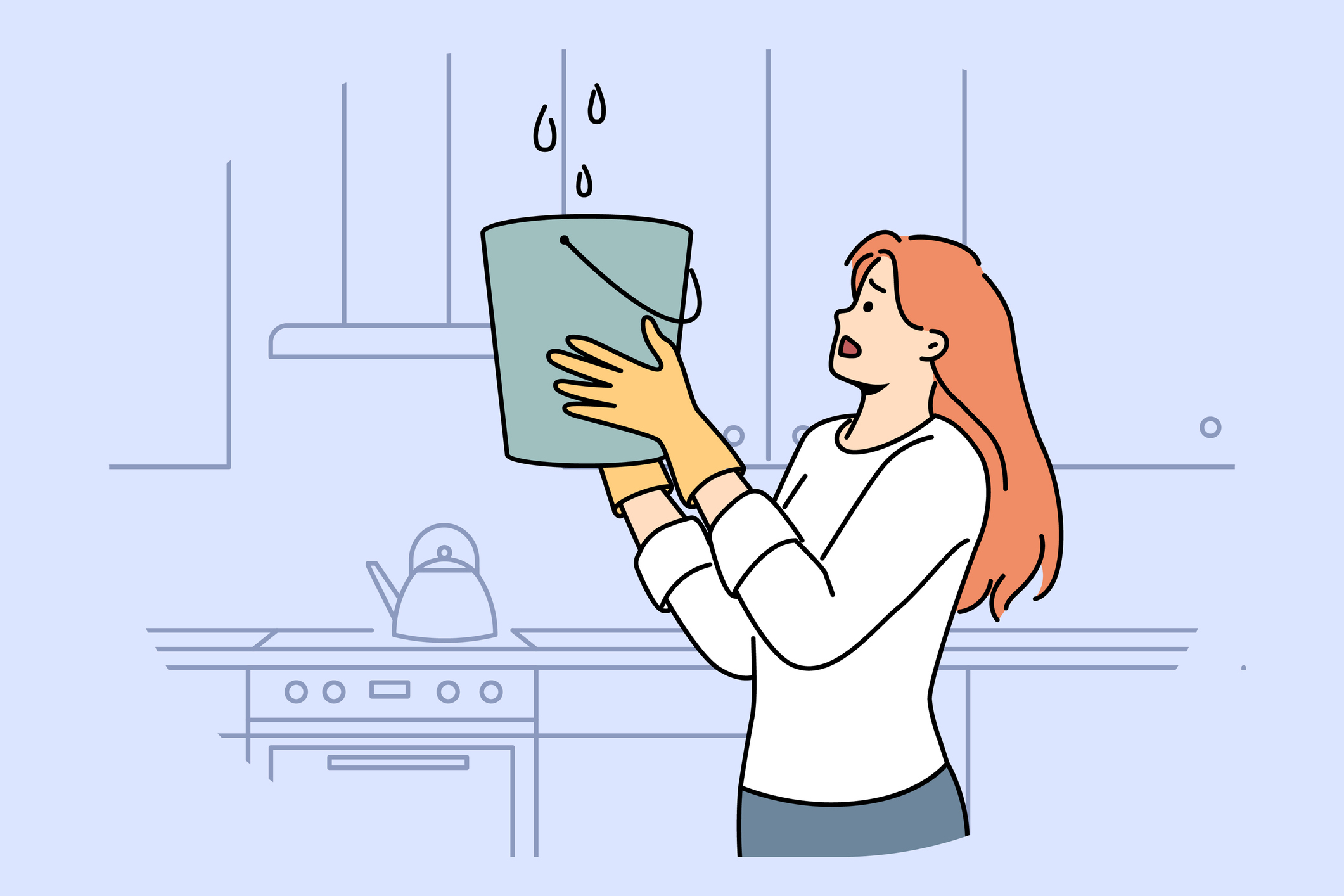
What to Do If You Find a Leak in Your Apartment

By Lilly Milman
May 22, 2024
There’s brown stains forming on your ceiling, you see paint cracking, or you hear an ominous dripping noise… In other words, you’re dealing with a leak somewhere in your apartment. Usually, when there’s a leak in your apartment, it’s not your fault — especially if it’s your ceiling leaking. However, you still have to address it in a timely matter before it causes property damage.
In this guide, we cover what actions you should take as a renter when you discover a leak in your apartment.
What are the signs of a leak in your apartment?
Some leaks are obvious and others can sneak up on you. Of course, if you see water dripping, then you have a leak in your apartment — but what if it’s less clear? Below are some signs that can help you identify a leak before there’s water all over your floor.
- You begin to see water stains on your ceiling or walls. If there is discoloration or brown stains, often in the shape of rings, forming anywhere on drywall, that’s a tell-tale sign of a water leak. Even if the discoloration is dry to the touch, it’s evidence that water is leaking somewhere.
- The paint on your ceiling or walls is peeling or cracking. If you have been noticing that your paint is flaking, peeling, or cracking, that could be a sign that moisture has been building up in an area over a longer period of time.
- The ceiling appears to be sagging. If your ceiling gets filled with water, you will literally be able to see it sometimes as it will appear to be sagging down with the weight of it.
What should you do if you discover a leak in a rental?
If you have identified the signs of a leak, then it’s time to take action (yes, even if you are just renting). Here are a few steps you can take immediately.
- Call your landlord or property management’s maintenance department. Whenever you discover an issue with your apartment — from a pest issue to a leak — it’s important that you let your landlord or building management team know immediately. Oftentimes, they’ll already have a process in place for how to deal with this issue.
- Take photos and/or videos of the damage. It’s also important to keep a paper trail when you need to get maintenance done in your apartment. Make sure to take photos and/or videos of all the signs you used to identify the leak, which you can send to your landlord to give them a sense of the damage that has already been done.
- Move any belongings out of the way. If there is an active leak dripping its way into your apartment, then you’ll want to protect your stuff. Move anything that’s in the path of the leak out of the way, whether it’s furniture or a rug. If you can’t move something out of the way, consider covering it with a waterproof covering. You can use a tarp, or even a shower curtain or plastic tablecloth to cover whatever is in the way in a pinch.
- Clean up any mess from the water. If there’s water on the floor or on your belongings, wipe it up quickly before any more damage is done. Once you’ve dried the floor off, you can lay down a tarp or shower curtain to protect it from further damage until the problem is solved.
- Find a vessel to catch the leaking water. Grab the nearest bucket or bin and place it under the leak to contain any water until the leak is sealed. Keep an eye on it, because you may need to swap it out if it gets too full.
- Talk to your neighbors about the leak. If your ceiling is leaking, the source is likely coming from outside your apartment. Talking to your neighbors can help you learn more about what caused the leak (for example, an upstairs neighbor may have accidentally flooded their apartment) and help them take preventative action before any damage comes to their apartment. Or, if they’ve also been seeing water damage in their place, you can come to your landlord together to let them know there’s a bigger issue in the building.
- File a claim with your renters insurance company. If you have a renters insurance policy, you’re in luck. Filing a claim with your insurance company can help cover damage to any of your personal belongings that got damaged. Just note that most policies won’t cover damage done by a natural disaster or flood; that would require a separate flood insurance policy.
What can cause a leak in your apartment?
Your landlord or maintenance person can likely narrow down the cause of the leak, but if you’d like to do some investigating yourself, take a look at our list of some of the most common causes for apartment leaks:
- Your upstairs neighbor flooded their apartment. Whether it’s from an overflowing bathtub, clogged toilet, or leaking an appliance, if you have a leaking ceiling, your upstairs neighbor is often the culprit. If you discover a new ceiling leak, go upstairs, check on them, and alert them to the issue.
- There’s something wrong with your appliances. Check your air conditioning unit, refrigerator, humidifier/dehumidifier, washing machine, water heater, and dishwasher when you’re trying to identify the source of your leak — especially if there are signs of discoloration around there. A faulty appliance can easily be the cause of a leak.
- Your building has broken pipes. It’ll be difficult to diagnose these kinds of leaks yourself, so you’ll want your landlord to call in an expert. If not properly dealt with, leaks that are caused by structural damage to an apartment building can cause mold and mildew over time.
- A natural disaster, like a flood or hurricane. Large storms, natural disasters, and floods can lead to your apartment getting water damage — especially if your unit is located on a lower level. It’s always a good idea to have an emergency plan in place for ensuring your safety if you live in an area that experiences flooding or hurricanes.
What are your renters rights if there is a leak in your apartment?
Because it’s often due to some sort of structural damage or a faulty appliance, a leak usually isn’t a tenant’s fault. For this reason, they often won’t be on the hook for paying for repairs for a water-damaged rental property. Of course, there are some scenarios where your landlord may determine that you were the cause of the issue — say, if you were the one who overfilled your bathtub or clogged and flooded your toilet — where you may need to help cover the costs of necessary repairs. If you’re unsure where your’s and your landlord’s responsibilities lie with maintenance issues and flooding, check the terms of your lease agreement. Look for a clause clearly outlining what to do in the event of damage to the unit.
If your landlord is not addressing water damage that you have documented and sent to them, then they also may be in breach of the implied warranty of habitability. There are laws in every state that dictate that landlords must provide a livable dwelling to tenants — and mold growth, mildew, or severe water damage in many states may cause a unit to be considered unlivable. One option is to call your city or state’s health department to have them inspect your apartment. Another is to check your state’s laws to learn more about your tenants rights are under the implied warranty of habitability, and seek legal advice.
The Bottom Line
A leak in your apartment most likely isn’t your fault, but that doesn’t mean you should ignore it. Take the time to document damage, protect your belongings, call the property owner and your neighbors, and file a claim with your renters insurance. Your landlord should be able to take it from there.
Top cities
Atlanta Apartments
1,825 apartments starting at $630/month
Austin Apartments
6,133 apartments starting at $600/month
Baltimore Apartments
1,423 apartments starting at $640/month
Boston Apartments
5,609 apartments starting at $425/month
Charlotte Apartments
2,980 apartments starting at $570/month
Chicago Apartments
5,458 apartments starting at $400/month
Dallas Apartments
5,455 apartments starting at $625/month
Fort Worth Apartments
2,695 apartments starting at $695/month
Houston Apartments
5,813 apartments starting at $450/month
Las Vegas Apartments
1,016 apartments starting at $795/month
Los Angeles Apartments
12,712 apartments starting at $750/month
Miami Apartments
702 apartments starting at $1,200/month
Milwaukee Apartments
1,106 apartments starting at $475/month
New York Apartments
8,874 apartments starting at $600/month
Oakland Apartments
983 apartments starting at $850/month
Orlando Apartments
877 apartments starting at $895/month
Philadelphia Apartments
3,614 apartments starting at $500/month
Phoenix Apartments
3,461 apartments starting at $592/month
Pittsburgh Apartments
1,382 apartments starting at $590/month
Portland Apartments
2,260 apartments starting at $575/month
Raleigh Apartments
1,471 apartments starting at $550/month
San Antonio Apartments
3,372 apartments starting at $525/month
San Diego Apartments
2,860 apartments starting at $650/month
San Francisco Apartments
664 apartments starting at $500/month
San Jose Apartments
516 apartments starting at $1,000/month
Seattle Apartments
3,520 apartments starting at $452/month
Tampa Apartments
776 apartments starting at $808/month
Washington DC Apartments
2,256 apartments starting at $910/month


